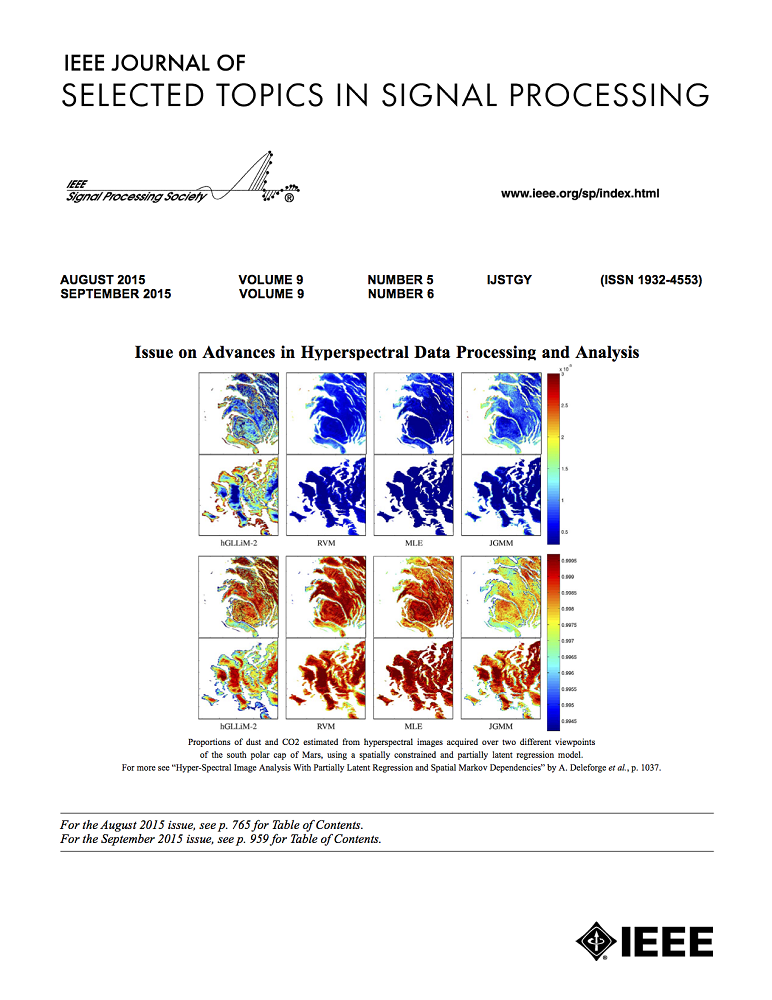用于近场全息多输入输出(MIMO)信道估计的贝叶斯最优无监督学习
IF 8.7
1区 工程技术
Q1 ENGINEERING, ELECTRICAL & ELECTRONIC
IEEE Journal of Selected Topics in Signal Processing
Pub Date : 2024-06-13
DOI:10.1109/JSTSP.2024.3414137
引用次数: 0
摘要
全息多输入多输出(HMIMO)通过在紧凑的空间内部署大量天线来充分利用电磁(EM)信道的潜力,被越来越多地认为是 6G 无线系统的一项关键使能技术。然而,如果没有估算高维信道的有效方法,HMIMO 系统的优势就无法充分释放,而由于近场区域的可达性,高维信道的分布变得越来越复杂。在本文中,我们要解决在未知电磁环境中运行的近场 HMIMO 系统中设计低复杂度贝叶斯最优信道估计器这一基本挑战。其核心思想是仅根据接收到的先导信号的 Stein' 分数函数和估计的噪声电平来估计 HMIMO 信道,而不依赖在实际部署中不可行的先验或监督。采用无监督去噪分数匹配目标训练神经网络,以学习参数化分数函数。同时,我们提出了一种基于主成分分析(PCA)的算法,利用低级近场空间相关性来估计噪声水平。在这些技术的基础上,我们以闭合形式为全数字 HMIMO 收发器开发了基于贝叶斯最优分数的信道估计器。通过将基于分数的最优估计器纳入低复杂度的消息传递算法,该估计器还扩展到了模拟-数字混合 HMIMO 系统。理论和大量仿真结果都验证了所提估计器的(准)贝叶斯最优性。除了最优性之外,我们的建议还对各种不匹配具有鲁棒性,并且由于其无监督的性质,能够以在线方式快速适应动态电磁环境,这证明了它在实际部署中的潜力。本文章由计算机程序翻译,如有差异,请以英文原文为准。
Bayes-Optimal Unsupervised Learning for Channel Estimation in Near-Field Holographic MIMO
Holographic MIMO (HMIMO) is being increasingly recognized as a key enabling technology for 6G wireless systems through the deployment of an extremely large number of antennas within a compact space to fully exploit the potentials of the electromagnetic (EM) channel. Nevertheless, the benefits of HMIMO systems cannot be fully unleashed without an efficient means to estimate the high-dimensional channel, whose distribution becomes increasingly complicated due to the accessibility of the near-field region. In this paper, we address the fundamental challenge of designing a
low-complexity Bayes-optimal
channel estimator in near-field HMIMO systems operating in
unknown
EM environments. The core idea is to estimate the HMIMO channels solely based on the Stein' s score function of the received pilot signals and an estimated noise level,
without
relying on priors or supervision that is not feasible in practical deployment. A neural network is trained with the unsupervised denoising score matching objective to learn the parameterized score function. Meanwhile, a principal component analysis (PCA)-based algorithm is proposed to estimate the noise level leveraging the low-rank near-field spatial correlation. Building upon these techniques, we develop a Bayes-optimal score-based channel estimator for fully-digital HMIMO transceivers in a closed form. The optimal score-based estimator is also extended to hybrid analog-digital HMIMO systems by incorporating it into a low-complexity message passing algorithm. The (quasi-) Bayes-optimality of the proposed estimators is validated both in theory and by extensive simulation results. In addition to optimality, it is shown that our proposal is robust to various mismatches and can quickly adapt to dynamic EM environments in an online manner thanks to its unsupervised nature, demonstrating its potential in real-world deployment.
求助全文
通过发布文献求助,成功后即可免费获取论文全文。
去求助
来源期刊

IEEE Journal of Selected Topics in Signal Processing
工程技术-工程:电子与电气
CiteScore
19.00
自引率
1.30%
发文量
135
审稿时长
3 months
期刊介绍:
The IEEE Journal of Selected Topics in Signal Processing (JSTSP) focuses on the Field of Interest of the IEEE Signal Processing Society, which encompasses the theory and application of various signal processing techniques. These techniques include filtering, coding, transmitting, estimating, detecting, analyzing, recognizing, synthesizing, recording, and reproducing signals using digital or analog devices. The term "signal" covers a wide range of data types, including audio, video, speech, image, communication, geophysical, sonar, radar, medical, musical, and others.
The journal format allows for in-depth exploration of signal processing topics, enabling the Society to cover both established and emerging areas. This includes interdisciplinary fields such as biomedical engineering and language processing, as well as areas not traditionally associated with engineering.
 求助内容:
求助内容: 应助结果提醒方式:
应助结果提醒方式:


